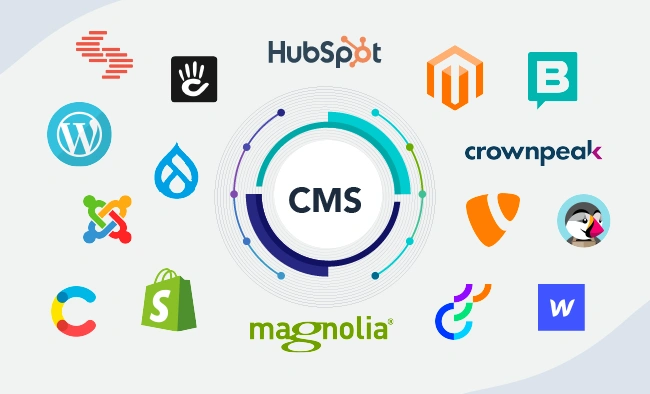
Your website is your digital storefront, a vital hub for attracting customers, showcasing your brand, and driving conversions. But a powerful website starts with a strong foundation: the Content Management System (CMS). Choosing the right CMS is crucial, impacting everything from ease of use to design flexibility and scalability.
Here’s the ultimate guide to navigating the CMS landscape and selecting the perfect platform to unleash your website’s true potential.
Demystifying the CMS:
Imagine your website as a beautiful house. The content – text, images, videos – is the furniture and décor. The CMS is the underlying structure – the framework that allows you to add, edit, and manage content without needing to know complex coding languages.
The CMS Checklist: What Matters Most
There’s no one-size-fits-all CMS solution. Before diving in, consider these key factors:
- Ease of Use: Can you navigate the platform intuitively? Is adding content and making edits a smooth process?
- Features and Functionality: Does the CMS offer all the features you need, like e-commerce capabilities, user management, or SEO optimization tools?
- Scalability: Will the CMS grow alongside your website? Can it handle increased traffic and content volume effortlessly?
- Security: Is your website data secure? Look for platforms with robust security features and regular updates.
- Customization: Does the CMS offer flexibility in terms of design and functionality? Can you customize the look and feel of your website to match your brand?
- Community and Support: Is there a strong developer community offering support and resources? Readily available support can be invaluable for troubleshooting.
Popular CMS Contenders: A Breakdown
Now, let’s explore some of the most popular CMS platforms:
- WordPress: The undisputed heavyweight, WordPress is user-friendly with a massive plugin ecosystem for adding features and functionalities. Ideal for blogs, portfolios, and basic business websites.
- Wix: Great for beginners, Wix offers a user-friendly drag-and-drop interface with beautiful pre-designed templates. However, customization can be limited.
- Squarespace: Similar to Wix, Squarespace boasts ease of use and stunning templates. It’s a good choice for creatives and small businesses, but scalability might be an issue for larger websites.
- Drupal: A powerhouse CMS for complex websites, Drupal requires some technical expertise but offers ultimate customization and security. A popular choice for large organizations and educational institutions.
- Magento: Built specifically for e-commerce, Magento offers a robust set of features for managing online stores. It requires developer resources but can handle large-scale online businesses.
Making the Final Choice:
There’s no single “best” CMS. Consider your website’s goals, technical skills, and budget. Here are some additional tips:
- Explore Free Trials: Many CMS platforms offer free trials so you can test-drive them before committing.
- Research User Reviews: Read independent reviews and user experiences with different CMS platforms to get a well-rounded perspective.
- Consider Managed Hosting: Managed hosting plans for popular CMS platforms can simplify maintenance and security concerns.
Unleashing Your Website’s Potential
Choosing the right CMS sets the stage for your website’s success. With a solid foundation in place, you can focus on creating engaging content, crafting a captivating design, and attracting your target audience. So, invest time in selecting the right CMS – it’s a decision that will have a lasting impact on your website’s journey.
Ready to unleash the full potential of your website? Get in touch with our web development experts today for a free consultation! We can help you choose the right CMS and build a website that achieves your business goals.
